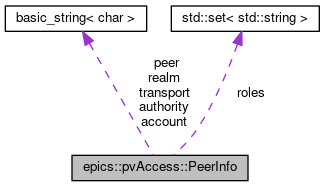Information provded by a client to a server-type ChannelProvider. More...
#include <remote/pv/security.h>

Public Types | |
| typedef std::tr1::shared_ptr< PeerInfo > | shared_pointer |
| typedef std::tr1::shared_ptr< const PeerInfo > | const_shared_pointer |
| typedef std::tr1::weak_ptr< PeerInfo > | weak_pointer |
| typedef std::tr1::weak_ptr< const PeerInfo > | const_weak_pointer |
| typedef std::set< std::string > | roles_t |
Public Attributes | |
| std::string | peer |
| network address of remote peer. eg. "192.168.1.1:5075". | |
| std::string | transport |
| transport protocol used eg. "pva". Must not be empty. | |
| std::string | authority |
| authentication mechanism used. eg. "anonymous" or "gssapi". Must not be empty. | |
| std::string | realm |
| scope of authority. eg. "mylab.gov" | |
| std::string | account |
| aka. user name | |
| pvData::PVStructure::const_shared_pointer | aux |
| NULL or extra authority specific information. | |
| roles_t | roles |
| Set of strings which may be used to modify access control decisions. | |
| unsigned | transportVersion |
| If applicable, the protocol minor version number. | |
| bool | local |
| Short-hand for transport=="local". | |
| bool | identified |
| Short-hand for authority!="anonymous". | |
Static Public Attributes | |
| static size_t | num_instances |
Detailed Description
Information provded by a client to a server-type ChannelProvider.
All peers must be identified by a peer name, which may be a network address (IP+port#) and transport. Peer names must be unique for a given transport.
Transport names include:
"local" in-process client. Peer name is optional and arbitrary. Must set local flag.
"pva" PVA over TCP. Used by PVA client provider. Peer name is IP address and TCP port number as "XXX.XXX.XXX.XXX:YYYYY".
Authority names include:
"anonymous" - No credentials provided. Must not set identified flag. "plain" - Unauthenticated credential.
Definition at line 119 of file security.h.
Member Typedef Documentation
◆ const_shared_pointer
| std::tr1::shared_ptr<const PeerInfo> epics::pvAccess::PeerInfo::const_shared_pointer |
Definition at line 120 of file security.h.
◆ const_weak_pointer
| std::tr1::weak_ptr<const PeerInfo> epics::pvAccess::PeerInfo::const_weak_pointer |
Definition at line 120 of file security.h.
◆ roles_t
| std::set<std::string> epics::pvAccess::PeerInfo::roles_t |
Definition at line 133 of file security.h.
◆ shared_pointer
| std::tr1::shared_ptr<PeerInfo> epics::pvAccess::PeerInfo::shared_pointer |
Definition at line 120 of file security.h.
◆ weak_pointer
| std::tr1::weak_ptr<PeerInfo> epics::pvAccess::PeerInfo::weak_pointer |
Definition at line 120 of file security.h.
Member Data Documentation
◆ account
| std::string epics::pvAccess::PeerInfo::account |
aka. user name
Definition at line 128 of file security.h.
◆ authority
| std::string epics::pvAccess::PeerInfo::authority |
authentication mechanism used. eg. "anonymous" or "gssapi". Must not be empty.
Definition at line 126 of file security.h.
◆ aux
| pvData::PVStructure::const_shared_pointer epics::pvAccess::PeerInfo::aux |
NULL or extra authority specific information.
Definition at line 131 of file security.h.
◆ identified
| bool epics::pvAccess::PeerInfo::identified |
Short-hand for authority!="anonymous".
Definition at line 141 of file security.h.
◆ local
| bool epics::pvAccess::PeerInfo::local |
Short-hand for transport=="local".
Definition at line 140 of file security.h.
◆ num_instances
|
static |
Definition at line 122 of file security.h.
◆ peer
| std::string epics::pvAccess::PeerInfo::peer |
network address of remote peer. eg. "192.168.1.1:5075".
Definition at line 124 of file security.h.
◆ realm
| std::string epics::pvAccess::PeerInfo::realm |
scope of authority. eg. "mylab.gov"
Definition at line 127 of file security.h.
◆ roles
| roles_t epics::pvAccess::PeerInfo::roles |
Set of strings which may be used to modify access control decisions.
Definition at line 135 of file security.h.
◆ transport
| std::string epics::pvAccess::PeerInfo::transport |
transport protocol used eg. "pva". Must not be empty.
Definition at line 125 of file security.h.
◆ transportVersion
| unsigned epics::pvAccess::PeerInfo::transportVersion |
If applicable, the protocol minor version number.
Definition at line 137 of file security.h.
The documentation for this struct was generated from the following file:
- remote/pv/security.h
Generated on Mon Dec 15 2025 12:55:48 for pvAccessCPP by